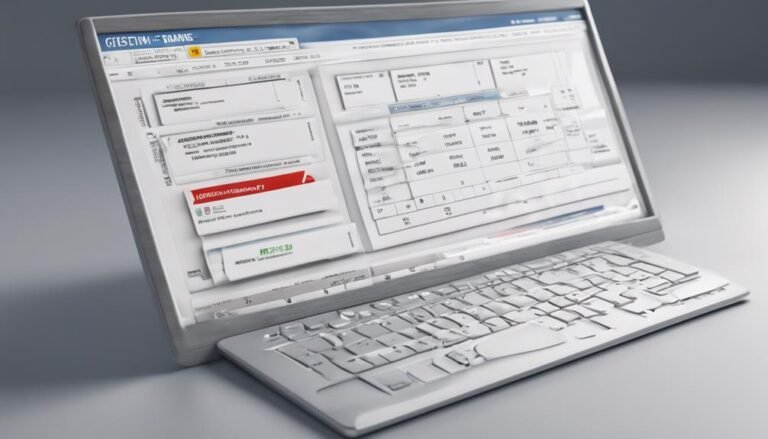What Is a Chargeback? Definition, How to Dispute, and Example
A chargeback is a transaction reversal that can be initiated in cases of unauthorized payments, billing errors, fraud, or undelivered goods. Merchants or cardholder banks can trigger a chargeback, impacting both financially and in reputation. Resolving disputes requires meticulous documentation and adherence to protocols, with potential refunds or denials. Understanding clear communication and essential prevention strategies is crucial to minimize financial losses and maintain trust. Exploring real-life case studies can offer valuable insights into handling the complexities of chargebacks. Mastering these intricacies can enhance your understanding of payment disputes and resolutions.
Key Takeaways
- Chargeback is a mechanism in payment cards.
- Disputes arise from unauthorized transactions, billing errors, or fraud.
- Detailed evidence is crucial for challenging chargebacks.
- The resolution process involves thorough evidence analysis.
- Chargeback prevention includes fraud measures and clear communication.
Chargeback Definition
The concept of a chargeback encapsulates an essential aspect of payment card transactions, representing a mechanism through which funds are returned following a customer's dispute of a particular transaction.
The initiating process for a chargeback can be initiated either by the merchant or the cardholder's issuing bank. One common misconception about chargebacks is that they are similar to refunds initiated by the customer; however, chargebacks are different as they involve the card issuer's intervention due to disputed charges.
Understanding this distinction is vital in comprehending the role and purpose of chargebacks in payment card transactions. By recognizing this key difference, both merchants and consumers can navigate the chargeback process more effectively and guarantee a fair resolution in cases of disputed transactions.
Initiating a Chargeback
Initiating a chargeback involves a structured process that allows cardholders to dispute transactions and seek resolution through the intervention of the card issuer or the merchant. To understand the dynamics of chargebacks better, let's explore the criteria for chargeback eligibility and the impact it can have on merchants.
| Chargeback Eligibility Criteria | Chargeback Impact on Merchants |
|---|---|
| – Unauthorized transactions | – Financial losses |
| – Billing errors | – Damage to reputation |
| – Fraudulent activities | – Increased operational costs |
| – Goods not received | – Risk of losing merchant account |
These factors play an important role in determining the validity of a chargeback and highlight the potential consequences for merchants.
Disputing Chargeback Reasons
When contesting chargebacks, merchants can effectively challenge various reasons for disputed transactions through meticulous documentation and strategic communication.
- Chargeback documentation requirements
- Chargeback escalation process
- Detailed transaction records
Merchants should make sure they have detailed transaction records, including customer communications, invoices, receipts, and shipping information, to support their case. Additionally, understanding the chargeback escalation process is important, as it outlines the steps involved if a dispute progresses to a more formal resolution. By adhering to chargeback documentation requirements and being prepared for the escalation process, merchants can improve their chances of successfully disputing chargebacks and recovering funds.
Chargeback Resolution Process
Effective chargeback resolution necessitates a meticulous analysis of evidence and adherence to established protocols to reach a fair outcome for all parties involved.
The chargeback investigation process involves the acquirer reviewing evidence from both the merchant and the cardholder, potentially leading to a refund or denial. If disputes cannot be resolved at this stage, chargeback mediation or escalation procedures may be initiated.
It is important to follow the chargeback resolution timeline, typically around 30 days for merchants to respond to chargebacks. Timely and thorough communication, along with the presentation of compelling documentation, is essential in maneuvering the chargeback resolution process efficiently and effectively.
Chargeback Fees and Penalties
Merchants are subject to specified fees and penalties associated with chargeback transactions, as outlined in their merchant agreements.
- Merchant responsibility, chargeback fees
- Impact of chargeback penalties
- Resolution through direct contact with the merchant
Merchants typically bear the chargeback fees incurred during transactions. In cases other than fraud, disputes can often be resolved by directly engaging with the merchant. Chargeback penalties can have financial implications beyond just the transaction fees, making it important for merchants to address and minimize chargeback occurrences promptly. It is essential for merchants to understand the terms outlined in their agreements to effectively manage chargeback fees and penalties.
Chargeback Example Case Study
In understanding the implications of chargeback fees and penalties on merchants, it is imperative to examine a practical case study illustrating the dynamics of a chargeback scenario. Real-life scenarios can shed light on the challenges faced by both customers and merchants in resolving disputes.
For instance, a customer claims they never received goods, while the merchant provides shipping confirmation as evidence. In such cases, the acquirer plays a pivotal role by reviewing evidence from both parties and making a decision to either refund or deny the chargeback.
These experiences highlight the importance of clear communication with customers and the need for detailed documentation to prevent and address chargeback situations effectively.
Chargeback Prevention Strategies
Implementing proactive measures to minimize chargebacks is essential for maintaining financial stability and customer trust in e-commerce transactions. To prevent chargebacks effectively, consider the following strategies:
- Fraud Prevention: Utilize advanced fraud detection tools and authentication processes to identify and prevent fraudulent transactions before they occur.
- Customer Communication: Keep customers informed throughout the purchasing process, provide clear terms and conditions, and offer responsive customer support to address any concerns promptly.
- Transaction Monitoring: Regularly monitor transactions for any suspicious activity, unusual patterns, or potential signs of fraud to take immediate action and prevent chargebacks.
Conclusion
To sum up, chargebacks play a vital role in resolving payment disputes between merchants and customers. Understanding the definition, process, and implications of chargebacks is essential for effective dispute resolution.
One interesting statistic to note is that chargebacks cost merchants an estimated $31 billion annually, highlighting the significant financial impact of payment disputes in the commercial sector.
By implementing proactive prevention strategies and managing the resolution process efficiently, businesses can mitigate the challenges associated with chargebacks.







